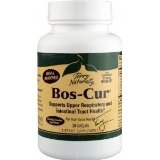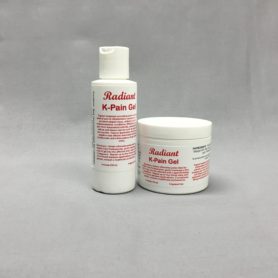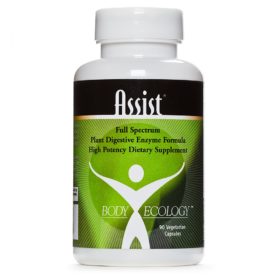Description
BOS-CUR by Terry Naturally
Supports a Healthy Inflammation Response with Boweillia and Curcumin
BOS-CUR provides the clinically proven power of BosPure boswellia and BCM-95 curcumin support a healthy inflammation response. This includes:
- Healthy Digestion and bowel function
- Respiratory health and inflammation response
Two Amazing Ingredients = One Powerhouse Supplement
Boswellia provides excellent natural support for a healthy inflammation response. Additionally, patented Bospure boswellia is filtered to reduce ellic acid, which can potentially promote, rather than balance inflammation – to just 5% or less, compared to up to 20 in plain boswellia. It also provides AKBA, which is considered one of boswellia’s most beneficial compounds, boosting the benefits of the extract even further.
Boswellia, also known as Indian Frankincense, is an herbal extract taken from the Boswellia serrata tree.
Resin made from boswellia extract has been used for centuries in Asian and African folk medicine to treat chronic inflammatory illnesses, as well as a number of other health conditions.
Studies show that boswellia may reduce inflammation and may be useful in treating:
- osteoarthritis
- rheumatoid arthritis (RA)
- asthma
- inflammatory bowel disease
Besides being an effective anti-inflammatory, boswellia can be an effective painkiller and may prevent the loss of cartilage. Some studies have found that it may even be useful in treating certain cancers, such as leukemia and breast cancer.
Boswellia may interact with and decrease the effects of anti-inflammatories like ibuprofen and other medications. Talk to your doctor before using boswellia products, especially if you’re taking other medications to treat inflammation.
Important: Boswellia may be an emmenagogue and abortificient. This means it can stimulate menstruation and induce miscarriage by increasing blood flow in the uterus. Pregnant women are advised to avoid this herb.
How It Works
Some studies show that boswellic acid can prevent the formation of leukotrienes in the body. Leukotrienes have been identified as a cause of inflammation and may trigger asthma symptoms.
Four acids in boswellia resin contribute to the herb’s anti-inflammatory properties. These acids inhibit 5-lipoxygenase (5-LO), an enzyme that produces leukotriene. Acetyl-11-keto-β-boswellic acid (AKBA) is thought to be the most powerful of the four boswellic acids. However, some studies suggest other boswellic acids are responsible for the herb’s anti-inflammatory properties.
Boswellia products are generally rated on their concentration of boswellic acids.
Applications
Osteoarthritis (OA)
Many studies of boswellia’s effect on OA have found that it’s effective in treating OA pain and inflammation.
One study published in the journal Phytomedicine found that all 30 patients with OA knee pain who received boswellia reported a decrease in knee pain. They also reported an increase in how far they could walk and knee flexion.
Another study, funded by a boswellia production company, found that increasing the dosage of enriched boswellia extract led to an increase in physical ability. OA knee pain decreased after 90 days with the boswellia product, compared to a lesser dosage and placebo. It also helped reduce the levels of a cartilage-degrading enzyme.
Rheumatoid Arthritis (RA)
Studies on the usefulness of boswellia in RA treatment have shown mixed results. One study published in the Journal of Rheumatology found that boswellia might help to reduce RA joint swelling. However, it also revealed that boswellia does not work any better than a placebo in affecting other RA measures.
Some research suggests that boswellia may interfere with the autoimmune process, which would make it an effective therapy for RA.
Inflammatory Bowel Disease
Due to the herb’s anti-inflammatory properties, boswellia may be effective in treating inflammatory bowel disease and ulcerative colitis.
A study compared H15, a special boswellia extract, to the anti-inflammatory prescription drug mesalamine. It showed no “statistical difference” in the Crohn’s Activity Index. This indicated that boswellia “may play a helpful role in Crohn’s disease.”
Separate studies found the herb could be effective in treating ulcerative colitis as well.
Asthma
Boswellia can play a role in reducing leukotrienes, which causes bronchial muscles to contract. A study of the herb’s effect on bronchial asthma found that patients who took boswellia experienced decreased asthma symptoms and asthma indicators.
This 1998 German study showed the herb could play an important role in treating bronchial asthma.
Cancer
Boswellic acids act in a number of ways that may inhibit cancer growth. Boswellic acids have been shown to prevent certain enzymes from negatively affecting DNA.
Studies have also found that boswellia may fight advanced breast cancer cells, and it may limit the spread of malignant leukemia and brain tumor cells. Another study showed boswellic acids to be effective in suppressing the invasion of pancreatic cancer cells.
Dosage
Boswellia products can differ greatly. Follow the manufacturer’s instructions, and remember to speak to your doctor before using any herbal therapy.
General dosing guidelines suggest taking 300-500 milligrams (mg) by mouth two to three times a day. The dosage may need to be higher for inflammatory bowel disease.
The Arthritis Foundation suggests 300-400 mg three times per day of a product that contains 60 percent boswellic acids.
Adverse Effects
Boswellia may stimulate blood flow in the uterus and pelvis. It can accelerate menstrual flow and may induce miscarriage in pregnant women.
Other possible side effects of boswellia include:
- Nausea
- Diarrea
- Acid Reflux
- Skin Rash
Traditional use of the herb boswellia has been celebrated for thousands of years. Also known as frankincense, boswellia was considered so valuable in ancient times that it was one of the choice gifts brought by the Wise Men to Baby Jesus. Boswellia has not been a part of conventional medicine, nor is it one of the most popular herbs in the lay press, but it does have some properties that could provide substantial benefit for many of today’s chronic illnesses.
Boswellia has become a popular herb recently for its benefits in fighting inflammation, which involves many processes that the body uses to help heal itself. It is most evident when we sprain an ankle and develop swelling and tenderness. However, inflammation that goes on day after day can lead to chronic problems such as arthritis or cancer. Boswellia appears to have the ability to counteract inflammation [Source: Ammon, Kulkarni]. This anti-inflammatory effect could correlate to benefit many chronic illnesses like arthritis, asthma and inflammatory bowel disease.
Boswellia faces the same challenge that many herbs with a history of use face; it is fairly new to the research field. That being said, there is incoming data that supports boswellia’s role in chronic illness. It has a long history of use in India for arthritis, and research shows that boswellia in combination with curcumin is helpful for arthritis pain [Source: Chopra, Kulkarni]. Asthma is another chronic illness affected by inflammation. Asthma sufferers noted less attacks and better measurable air movement through the lungs when treating with boswellia [Source:Gupta]. Ulcerative colitis represents another disease in which the bowels are plagued with chronic inflammation. It too has had benefit through boswellia [Source: Gupta]. There is data to suggest that boswellia can even modify inflammation seen with swelling from cancer of the brain, perhaps with swelling that comes with cancer treatment [Source: Streffer]. In fact, boswellia might have the ability to fight several different types of cancer cells, including brain cancer cells [Source: Glaser, Hostanska].
While asthma and inflammatory bowel disease could be areas that can benefit from boswellia treatment, one of the biggest areas of use for boswellia is arthritis. Dosage tends to be 300-400 mg three times a day [Source: Jaber]. For those looking for arthritis treatments, boswellia is best if used in combination with turmeric, another anti-inflammatory herb and joint tissue supplement like MSM or glucosamine. Boswellia and its early success is quite exciting. It does not quite have the body of literature that turmeric, essential fatty acids, CoQ10 and vitamin D have, but it could still be useful for many chronic diseases.
It is hard to know exactly why the Wise Men of ancient times valued boswellia so highly, but it is becoming clear that it does have the ability to help the body in many ways. Inflammation is becoming more recognized as the plague of developed nations everywhere. Diet, exercise and anti-inflammatory supplements like boswellia might be the best line of defense.
Traditional use of the herb boswellia has been celebrated for thousands of years. Also known as frankincense, boswellia was considered so valuable in ancient times that it was one of the choice gifts brought by the Wise Men to Baby Jesus. Boswellia has not been a part of conventional medicine, nor is it one of the most popular herbs in the lay press, but it does have some properties that could provide substantial benefit for many of today’s chronic illnesses.
Boswellia has become a popular herb recently for its benefits in fighting inflammation, which involves many processes that the body uses to help heal itself. It is most evident when we sprain an ankle and develop swelling and tenderness. However, inflammation that goes on day after day can lead to chronic problems such as arthritis or cancer. Boswellia appears to have the ability to counteract inflammation [Source: Ammon, Kulkarni]. This anti-inflammatory effect could correlate to benefit many chronic illnesses like arthritis, asthma and inflammatory bowel disease.
Boswellia faces the same challenge that many herbs with a history of use face; it is fairly new to the research field. That being said, there is incoming data that supports boswellia’s role in chronic illness. It has a long history of use in India for arthritis, and research shows that boswellia in combination with curcumin is helpful for arthritis pain [Source: Chopra, Kulkarni]. Asthma is another chronic illness affected by inflammation. Asthma sufferers noted less attacks and better measurable air movement through the lungs when treating with boswellia [Source:Gupta]. Ulcerative colitis represents another disease in which the bowels are plagued with chronic inflammation. It too has had benefit through boswellia [Source: Gupta]. There is data to suggest that boswellia can even modify inflammation seen with swelling from cancer of the brain, perhaps with swelling that comes with cancer treatment [Source: Streffer]. In fact, boswellia might have the ability to fight several different types of cancer cells, including brain cancer cells [Source: Glaser, Hostanska].
While asthma and inflammatory bowel disease could be areas that can benefit from boswellia treatment, one of the biggest areas of use for boswellia is arthritis. Dosage tends to be 300-400 mg three times a day [Source: Jaber]. For those looking for arthritis treatments, boswellia is best if used in combination with turmeric, another anti-inflammatory herb and joint tissue supplement like MSM or glucosamine. Boswellia and its early success is quite exciting. It does not quite have the body of literature that turmeric, essential fatty acids, CoQ10 and vitamin D have, but it could still be useful for many chronic diseases.
It is hard to know exactly why the Wise Men of ancient times valued boswellia so highly, but it is becoming clear that it does have the ability to help the body in many ways. Inflammation is becoming more recognized as the plague of developed nations everywhere. Diet, exercise and anti-inflammatory supplements like boswellia might be the best line of defense.
Traditional use of the herb boswellia has been celebrated for thousands of years. Also known as frankincense, boswellia was considered so valuable in ancient times that it was one of the choice gifts brought by the Wise Men to Baby Jesus. Boswellia has not been a part of conventional medicine, nor is it one of the most popular herbs in the lay press, but it does have some properties that could provide substantial benefit for many of today’s chronic illnesses.
Boswellia has become a popular herb recently for its benefits in fighting inflammation, which involves many processes that the body uses to help heal itself. It is most evident when we sprain an ankle and develop swelling and tenderness. However, inflammation that goes on day after day can lead to chronic problems such as arthritis or cancer. Boswellia appears to have the ability to counteract inflammation [Source: Ammon, Kulkarni]. This anti-inflammatory effect could correlate to benefit many chronic illnesses like arthritis, asthma and inflammatory bowel disease.
Boswellia faces the same challenge that many herbs with a history of use face; it is fairly new to the research field. That being said, there is incoming data that supports boswellia’s role in chronic illness. It has a long history of use in India for arthritis, and research shows that boswellia in combination with curcumin is helpful for arthritis pain [Source: Chopra, Kulkarni]. Asthma is another chronic illness affected by inflammation. Asthma sufferers noted less attacks and better measurable air movement through the lungs when treating with boswellia [Source:Gupta]. Ulcerative colitis represents another disease in which the bowels are plagued with chronic inflammation. It too has had benefit through boswellia [Source: Gupta]. There is data to suggest that boswellia can even modify inflammation seen with swelling from cancer of the brain, perhaps with swelling that comes with cancer treatment [Source: Streffer]. In fact, boswellia might have the ability to fight several different types of cancer cells, including brain cancer cells [Source: Glaser, Hostanska].
While asthma and inflammatory bowel disease could be areas that can benefit from boswellia treatment, one of the biggest areas of use for boswellia is arthritis. Dosage tends to be 300-400 mg three times a day [Source: Jaber]. For those looking for arthritis treatments, boswellia is best if used in combination with turmeric, another anti-inflammatory herb and joint tissue supplement like MSM or glucosamine. Boswellia and its early success is quite exciting. It does not quite have the body of literature that turmeric, essential fatty acids, CoQ10 and vitamin D have, but it could still be useful for many chronic diseases.
It is hard to know exactly why the Wise Men of ancient times valued boswellia so highly, but it is becoming clear that it does have the ability to help the body in many ways. Inflammation is becoming more recognized as the plague of developed nations everywhere. Diet, exercise and anti-inflammatory supplements like boswellia might be the best line of defense.
Traditional use of the herb boswellia has been celebrated for thousands of years. Also known as frankincense, boswellia was considered so valuable in ancient times that it was one of the choice gifts brought by the Wise Men to Baby Jesus. Boswellia has not been a part of conventional medicine, nor is it one of the most popular herbs in the lay press, but it does have some properties that could provide substantial benefit for many of today’s chronic illnesses.
Boswellia has become a popular herb recently for its benefits in fighting inflammation, which involves many processes that the body uses to help heal itself. It is most evident when we sprain an ankle and develop swelling and tenderness. However, inflammation that goes on day after day can lead to chronic problems such as arthritis or cancer. Boswellia appears to have the ability to counteract inflammation [Source: Ammon, Kulkarni]. This anti-inflammatory effect could correlate to benefit many chronic illnesses like arthritis, asthma and inflammatory bowel disease.
Boswellia faces the same challenge that many herbs with a history of use face; it is fairly new to the research field. That being said, there is incoming data that supports boswellia’s role in chronic illness. It has a long history of use in India for arthritis, and research shows that boswellia in combination with curcumin is helpful for arthritis pain [Source: Chopra, Kulkarni]. Asthma is another chronic illness affected by inflammation. Asthma sufferers noted less attacks and better measurable air movement through the lungs when treating with boswellia [Source:Gupta]. Ulcerative colitis represents another disease in which the bowels are plagued with chronic inflammation. It too has had benefit through boswellia [Source: Gupta]. There is data to suggest that boswellia can even modify inflammation seen with swelling from cancer of the brain, perhaps with swelling that comes with cancer treatment [Source: Streffer]. In fact, boswellia might have the ability to fight several different types of cancer cells, including brain cancer cells [Source: Glaser, Hostanska].
While asthma and inflammatory bowel disease could be areas that can benefit from boswellia treatment, one of the biggest areas of use for boswellia is arthritis. Dosage tends to be 300-400 mg three times a day [Source: Jaber]. For those looking for arthritis treatments, boswellia is best if used in combination with turmeric, another anti-inflammatory herb and joint tissue supplement like MSM or glucosamine. Boswellia and its early success is quite exciting. It does not quite have the body of literature that turmeric, essential fatty acids, CoQ10 and vitamin D have, but it could still be useful for many chronic diseases.
It is hard to know exactly why the Wise Men of ancient times valued boswellia so highly, but it is becoming clear that it does have the ability to help the body in many ways. Inflammation is becoming more recognized as the plague of developed nations everywhere. Diet, exercise and anti-inflammatory supplements like boswellia might be the best line of defense.





